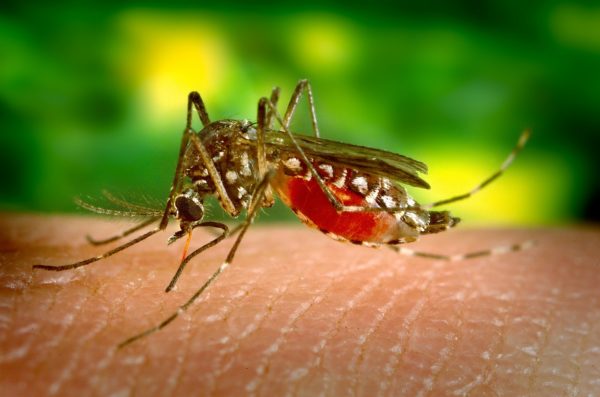
For the first time this mosquito season, the Health Department has detected mosquitoes with West Nile virus in New York City.
The infected Culex mosquitoes were collected in the Bronx and on Staten Island. No human cases have been reported to date. Mosquito season in New York City typically spans from April through September. The Health Department is increasing mosquito surveillance in the surrounding area by installing additional mosquito monitoring traps.
There are currently over 53 surveillance sites citywide. The Department uses an integrated management approach to control mosquitos which can transmit West Nile virus and will spray pesticide to target mosquitoes where persistent West Nile virus activity is detected. The City will continue its efforts to kill mosquito larvae before they can bite by applying larvicide in catch basins, marshland and other areas with standing water.
The Health Department has already begun catch basin larviciding. One helicopter-based larviciding event in the marsh areas of Staten Island, Brooklyn, Queens, and the Bronx was conducted this month.
“New Yorkers can take a few simple steps to protect themselves this summer, including by wearing insect repellent or covering their arms and legs,” said Health Commissioner Dr. Oxiris Barbot. “We also encourage everyone to remove any standing water that may harbor mosquitoes or call 311 for standing water they cannot manage themselves.”
The West Nile virus was first detected in New York City 21 years ago. Since 1999, the number of human cases has ranged from 3 to 47 annually. Of the 353 West Nile virus neuroinvasive disease cases overall, 46 (13%) have died due to their infection. The number of positive mosquito pools has also varied from 40 to 1,010 per year. New York City has over 40 species of mosquitos, but West Nile virus is transmitted primarily by several Culex species, including Culex salinarius and Culex pipiens.
West Nile virus infection can cause a mild or moderate febrile illness; and most (80%) of those infected have no symptoms at all. In some people, particularly those 50 and older or who have weakened immune systems, West Nile virus can cause a serious and potentially fatal infection of the brain and spinal cord. The most common symptoms are headache, fever, muscle aches, and extreme fatigue. Symptoms of more severe illness can also include changes in mental status and muscle weakness requiring hospitalization. If a person has symptoms of West Nile virus, they should contact or see your doctor.
The Health Department has successfully helped control mosquito-borne diseases since the West Nile virus was first detected. Throughout the early spring and summer, the Department conducts regular mosquito surveillance and currently has 106 surveillance traps in the five boroughs. The agency’s mosquito control efforts are data driven and rely on our mosquito trapping and testing results to determine areas of the city to spray pesticide and apply larvicide. Neighborhoods are treated by helicopter, truck or backpacks if enough criteria are met.
The Health Department has successfully helped control mosquito-borne diseases since the West Nile virus was first detected. Throughout the early spring and summer, the Department conducts regular mosquito surveillance and currently has 106 surveillance traps in the five boroughs. The agency’s mosquito control efforts are data driven and rely on our mosquito trapping and testing results to determine areas of the city to spray pesticide and apply larvicide. Neighborhoods are treated by helicopter, truck or backpacks if enough criteria are met.
Every year, as a part of normal outreach, the Health Department also conducts 80 to 90 presentations to educate communities about mosquito-borne illnesses. You can request community presentations on West Nile virus and other health topics.
To further reduce mosquito populations, the Health Department also removes standing water and applies larvicide to sites that cannot be emptied or drained; investigates standing water complaints filed through 311; and educates the public about mosquito-borne illnesses through outreach.
Reducing Exposure to Mosquitoes
- Use an approved insect repellent containing picaridin, DEET, oil of lemon eucalyptus (not for children under three), or products that contain the active ingredient IR3535.
- Make sure windows have screens. Repair or replace screens that have tears or holes.
- Eliminate any standing water from your property and dispose of containers that can collect water. Standing water is a violation of the New York City Health Code.
- Make sure roof gutters are clean and drained properly.
- Clean and chlorinate swimming pools, outdoor saunas and hot tubs. Keep them empty or covered if not in use. Drain water that collects in pool covers.
For more information about West Nile virus, or to report standing water, visit nyc.gov/health/wnv or call 311.
Become a Harlem Insider!
By submitting this form, you are consenting to receive marketing emails from: Harlem World Magazine, 2521 1/2 west 42nd street, Los Angeles, CA, 90008, https://www.harlemworldmagazine.com. You can revoke your consent to receive emails at any time by using the SafeUnsubscribe® link, found at the bottom of every email. Emails are serviced by Constant Contact








